Recently, a video of hedgehogs eating peanuts went viral. And all of a sudden, keepers switched
to a peanut-based snack for their hedgies. But wait a second! Can hedgehogs eat peanuts?
Hedgehogs can eat peanuts but only as occasional treats. These nuts are high in fats and phosphorus. As a result, the hedgies are at risk of obesity and metabolic bone disease. Besides, peanuts can get contaminated and cause aflatoxicosis in the hedgehogs.
Don’t get us wrong. Peanuts do have some health benefits for hedgehogs. But can they win over the downsides? Keep reading to find out!
Table of Contents
Can Hedgehogs Eat Peanuts?
In the wild, hedgehogs indeed eat peanuts from the ground. But here is the thing! No wild hedgie takes peanuts as their staple diet. They will munch on peanuts only as treats or sides.
Why? Peanuts are not nutritionally suitable for hedgehogs. According to Healthline, these nuts have a protein percentage of 22 – 30% and a fat content of about 49%.
Ideally, our prickly pigs require a meal with 30 – 50% protein and 10 – 20% fat. A peanut-based meal is slightly low in protein and higher in fat.
Moreover, there is a significant imbalance in calcium and phosphorus ratio. Generally, our quill balls require meals with a calcium: phosphorus ratio of 1:1 to 2:1. In peanuts, calcium and phosphorus amounts are 92 mg and 376 mg, respectfully.
Therefore, consuming peanuts in bulk will only ruin the hedgehog’s health. You can either offer them peanuts as a treat or avoid this item altogether.
Risks of Feeding Your Hedgehogs Peanuts
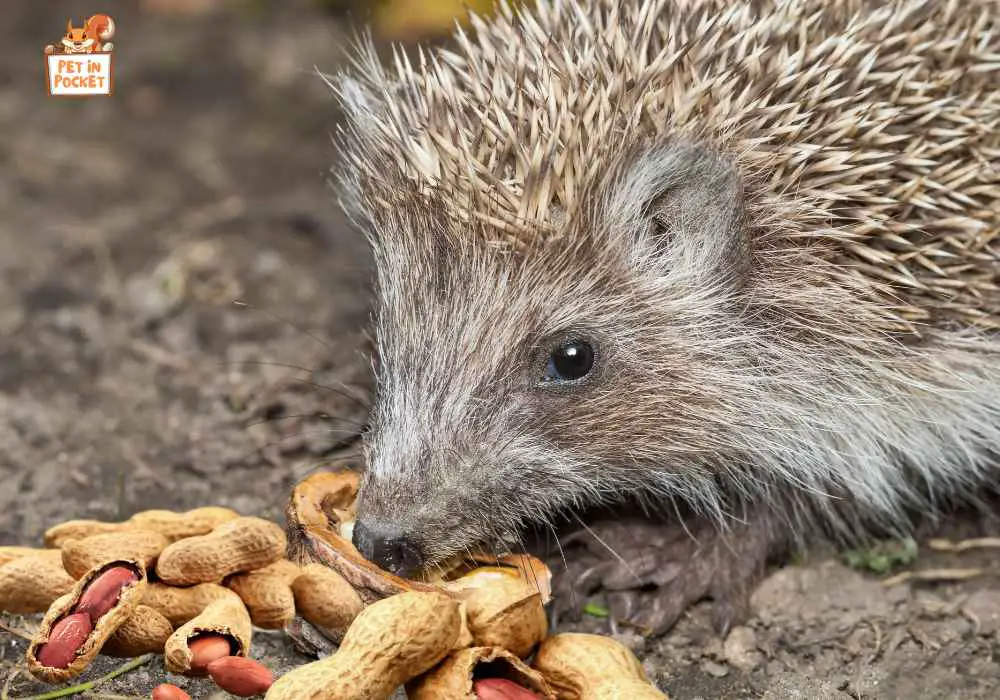
As a responsible keeper, you should never take your hedgehog’s health lightly. Your prickly pigs can fall dead sick if you carelessly feed them peanuts. Some darker sides of a peanut-based meal are:
1. Hedgehogs Turn Fat
A gentle reminder: the hedgehog’s digestion system can not process fat well. And as we know, peanuts are high in fatty content. So, it is only natural that a hedgie will take days to digest a fatty item.
No wonder feeding a hedgehog peanuts only pushes it towards obesity. The excess, unprocessed fat accumulates under the armpits and necks of the pet. As a result, the prickly pig can not move easily and spends hours resting.
Professionals claim that obesity can disturb the sleep cycle of obese hedgehogs. They often suffer from mental imbalance. Furthermore, the pocket pets are prone to joint pain and arthritis due to the lack of movement.
2. The Pet Can Fall Victim to Liver Damage
Peanuts can get contaminated with aflatoxins. This toxin is highly poisonous for the hedgehogs. Our little prickly hogs will suffer from aflatoxicosis even if they accidentally consume contaminated peanuts.
Liver damage is a common secondary effect of aflatoxicosis. Hedgehogs with defective liver die a premature death.
3. Danger of Metabolic Bone Disease
The phosphorus content in peanuts weighs more than calcium. This imbalance often leads to calcium deficiency in the hedgehogs. To beat the situation, their biological system starts stripping calcium from the bones. As a result, hedgies develop weak bones or metabolic bone disease (MBD).
Symptoms of MBD are,
- Bone fracture
- Broken teeth
- Overgrown jaw
- Splayed legs
- Limping
- Tremor
- Fatigue, etc.
Metabolic bone diseases can cause permanent damage to the quill balls. They can even get paralyzed for life.
4. Other Health Concerns
Unfortunately, peanuts lack the majority of nutrition vital for hedgehogs. So, offering the pets a peanut-focused meal will only raise the risk of mineral deficiency. Now, the hedgies will be prone to more diseases due to low immunity.
What Are The Health Benefits of Peanuts to Hedgehogs?
Honestly, peanuts are not completely useless for our quill balls. These nuts do have some advantages for the hedgies. Such as,
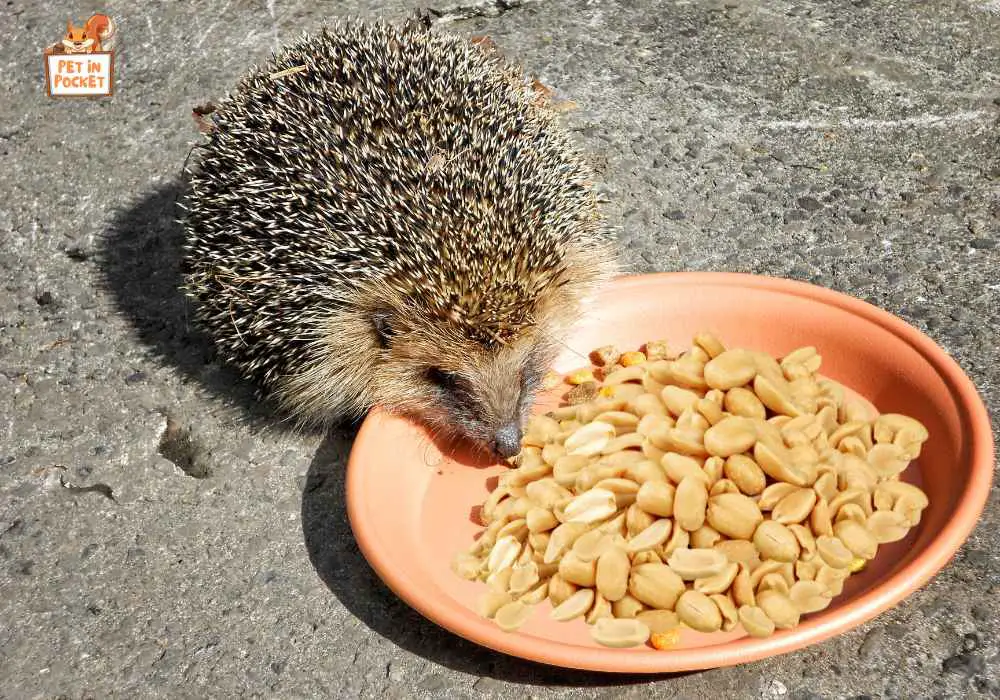
- Peanuts are rich in saturated fat. These fats keep the hedgehogs energetic and are good for their skin.
- We can find vitamin B3, vitamin E, manganese, copper, and other minerals in peanuts. Therefore, peanuts can promote good health in the hedgies.
- Peanuts are low in carbohydrates. Hence, you do not have to worry about carb indigestion in the prickly balls.
- Finally, peanuts are high in antioxidants. Peanut snacks will boost immunity in the hedgies and heal their injury quickly.
Should You Avoid Peanuts?
We do not advise removing peanuts completely from the hedgehog’s diet. Instead, our recommendation is to offer peanuts in moderation.
Add 1 or 2 peanuts with other items, e.g., mealworm, seed, etc., to prepare a delicious treat. Most importantly, offer your pets the peanut treat once or twice a week.
Well, if you are doubtful about the peanut’s mineral profile, avoid feeding it to your hedgehog. We strongly discourage you from taking any risk with your quill ball’s health.
Special Note
Salted and roasted peanuts are not recommended at all.
Can Hedgehogs Eat Peanut Butter?
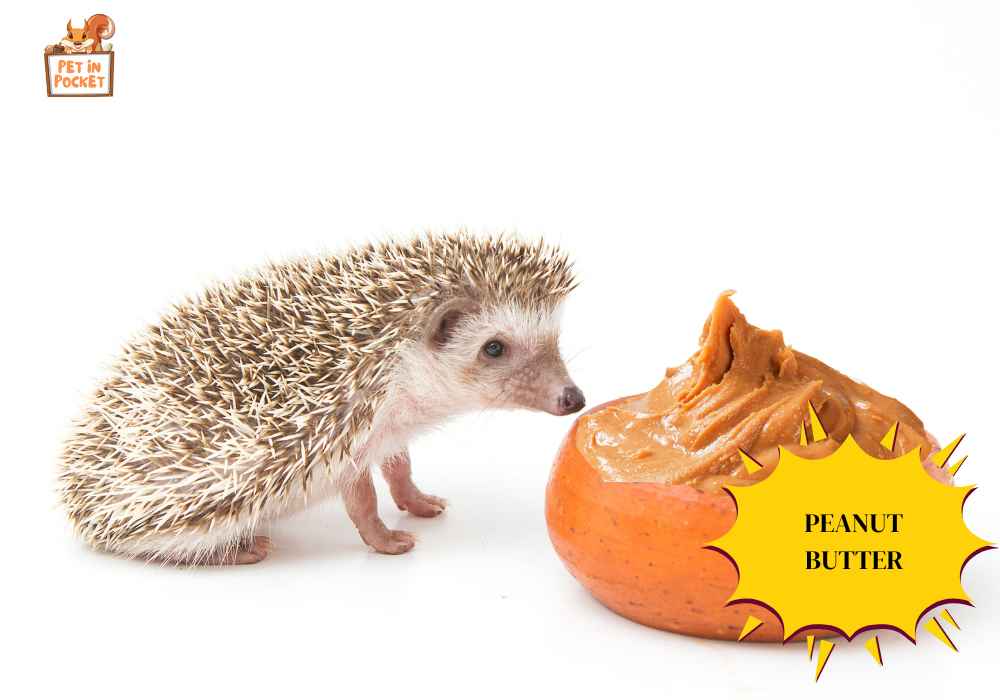
Though we allow our hedgehogs to munch on peanuts, peanut butter is a BIG NO for them. The reasons are obvious.
For starters, the sugar content in peanut butter is quite high and hedgehogs can not digest sugar. After a high-sugar meal, they suffer from vomiting, diarrhea, and stomach aches. Besides, sugar can cause tooth decay in the quill balls.
Next, according to Healthline, each 100 grams of peanut butter includes only 22.5 grams of protein and 51 grams of fats. It means obesity is confirmed in the hedgies.
Furthermore, the added vegetable oil and preservatives can bring disaster for the prickly pigs. They are vulnerable to heart disease and organ failure. Not to mention that the hedgehogs can choke on the thick peanut butter.
Thus, you better keep that peanut butter jar away from the hedgies.
What Do Hedgehogs Eat?
Of course, hedgehogs can not live on nuts and seeds. They are insectivores and require a diet accordingly.
Though animal protein makes up most of their meals, vegetables and fruits are necessary to balance nutrition. An ideal diet chart for hedgehogs looks as follows:
| Protein Source | Vegetable | Fruit | Commercial |
|---|---|---|---|
| Waxworms, hornworms, mealworms, grasshoppers, snails, crickets, black soldier flies, etc. | Leafy greens, zucchini, arugula, romaine lettuce, kale, broccoli, squash, dandelion green, cucumber, etc. | Apple, banana, cantaloupe, watermelon,Strawberries,blackberry, honeydew, mulberry, cherry, etc. | Hedgehog pellets, low, fat high protein cat and dog food |
Special Note
Offer your hedgehog 2 tablespoons of protein with 1 tablespoon of mixed greens and fruits.
Conclusion
Peanuts are safe for hedgehogs when fed in moderation. As peanuts are high in fat and phosphorus, they are only healthy as treats.
Many keepers avoid peanuts because of the risk of aflatoxin contamination. You can remove peanuts from your hedgie’s meal, and it will not affect them in any way.
FAQs
Can hedgehogs eat raw peanuts?
Hedgehogs can safely consume peanuts only as treats. Raw peanuts are definitely recommended for the hedgies. Salted and roasted peanuts can cause digestion and health problems in pets.
Are nuts OK for hedgehogs?
Nuts are a good source of protein and fats. As a result, nuts can fuel the hedgehogs to do more physical activities when you feed them in moderation. Anyway, the fat content in any nut is slightly higher. So, consuming nuts every day will lead to obesity, metabolic bone disease, liver damage, etc.
What are toxic to hedgehogs?
Hedgehogs can not digest high-fat and sugary items. So, processed food, junk items, sweet candy, etc., should be avoided. As hedgies are lactose intolerant, milk and bakery items are also harmful for them. Finally, do not add greens with high oxalate and phosphorus to their meal charts.
What do hedgehogs love eating?
Hedgehogs are insectivores, meaning they want a meal consisting of insects and worms. Their favorite foods are beetles, black soldier flies, snails, frogs, lizards, mealworms, waxworms, earthworms, grasshoppers, etc. These pets also enjoy occasional green and fruit treats
Can hedgehogs eat sunflower seeds?
Hedgehogs can eat sunflower seeds, but only in moderation. These seeds are high in fat and phosphorus. Therefore, a seed-focused diet will cause obesity, calcium deficiency, and metabolic bone disease in hedgies.

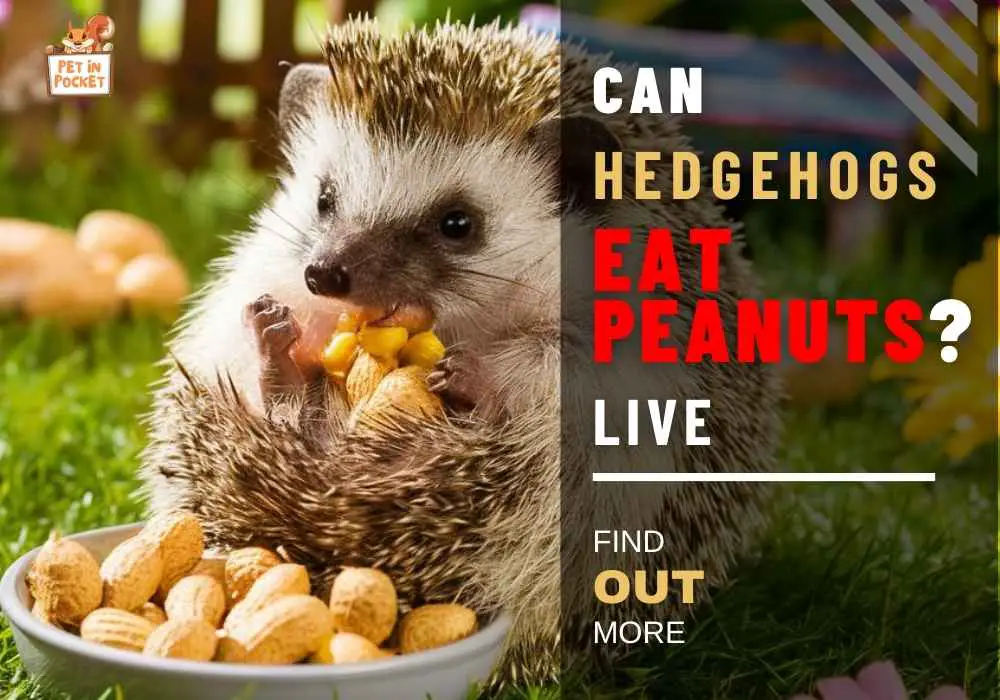

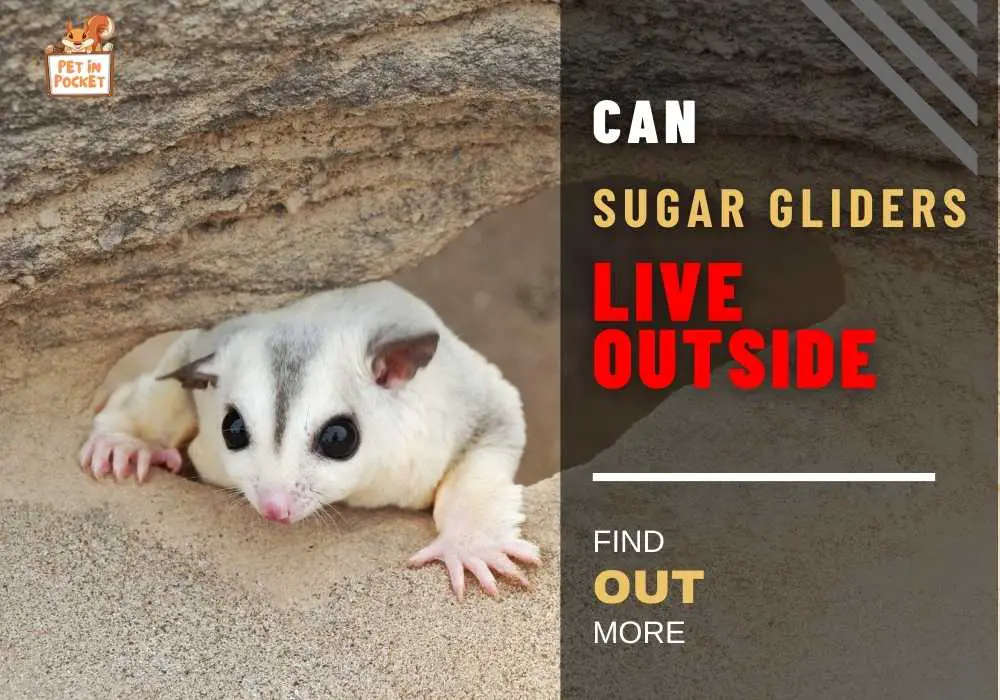

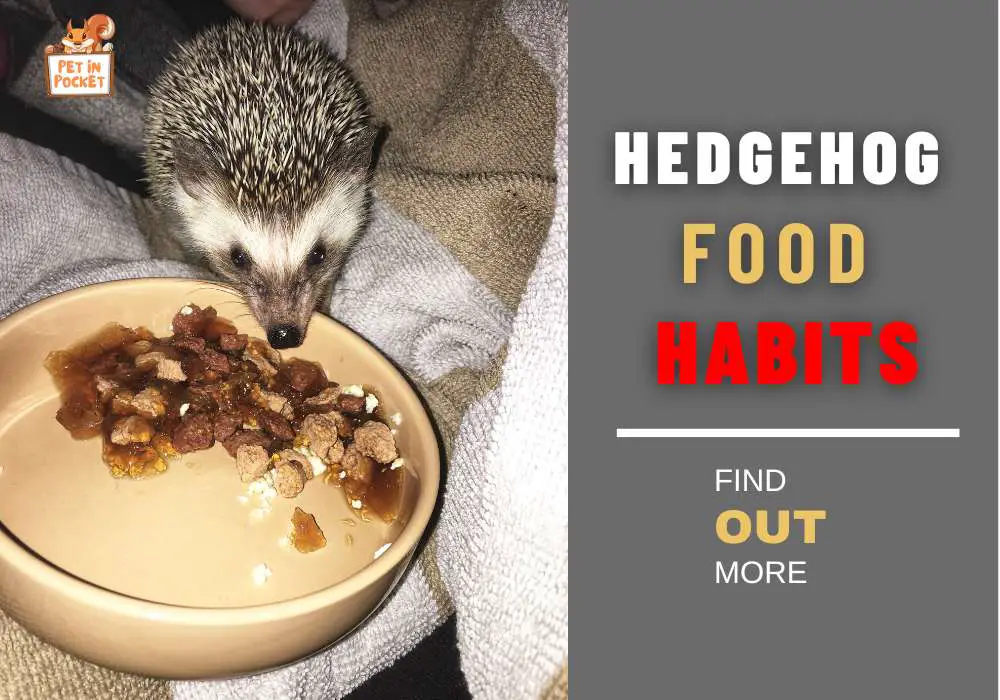
Leave a Reply